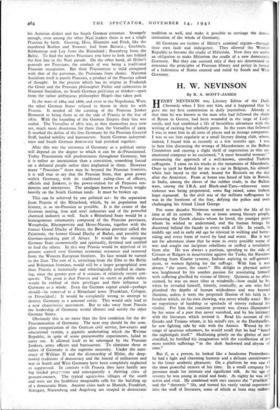H. W. NEVINSON
By R. A. SCOTT-JAMES ENRY NEVINSON was Literary Editor of the Daily
Chronicle when I first met him, and it happened that he gave me my first commission in daily journalism. Already at that time he was known as the man who had followed the shade of Byron in Greece, had been wounded in the siege of Lady- smith, and had combined a life of breathless adventure with the writing of exciting but scholarly prose. In the years that followed I was to meet him in all sorts of places and in strange companies. I was to see him regularly at a small literary dining club, where, indeed, I found him as recently as a few months ago. I was to hear him discussing the wrongs of Macedonians at the Balkan Committee and causing a slight thrill of expectation in this un- emotional company as he exclaimed, " A most beautiful woman! " announcing the approach of a well-known, unveiled Turkish suffragette. I came on his tracks in the mountains of Macedonia. Once in 1918 he flashed by me in a car in Belgium, his alteady white hair bared to the wind, bound for Brussels on the day after the Armistice. From at home one heard of him in Russia, in India, among the slaves of the rubber trade, in the Balkan wars, among the I.R.A. and Black-and-Tans—wherever some violence was being perpetrated, some flag raised, some forlorn hope espoused. In the civil war of the militant suffragettes he was in the forefront of the fray, defying the police and even challenging his friend Lloyd George.
For some decades Nevinson seemed to touch the life of his time at all its centres. He was at home among literary people, discussing the Greek classics whom he loved, the younger poets whom he wished to understand, and the human beings he discerned behind the façade in every walk of life. In youth, in middle age and in early old age he rejoiced in walking and horse- riding and every form of travel by land and water. But it was not for adventure alone that he went to every possible scene of war and sought out incipient rebellions or sniffed a revolution from afar. He was always a partisan, speeding to the side of Cretans or Bulgars in insurrection against the Turks, the Russians suffering from €zarist tyranny, Indians aspiring to self-govern- ment, or women fighting for the suffrage. With him it was always " the cause, the cause.' His delight in physical action was heightened by his sombre passion for associating himself with suffering glorified by visions of liberty. Quixotic as he often seemed, he was no mere titter at windmills—how could he be, when he revealed himself, bitterly, ironically, as one who had plumbed the depths of human wickedness and was beyond illusions, unless it were the perpetual illusion of his faith in a freedom which, on his own showing, was never wholly won? 'But no experience of hardship or spectacle of misery reduced his vitality. For him the transient present was always illuminated by his sense of a past that never vanished, and by his intimacy with the literature which revived it. Read his account of the Greeks and Trojans whom, in his mind's eye, in the Dardanelles, he saw fighting side by side with the Anzacs. Wooed by the songs of spurious reformers, he would-recall that he had " heard the nightingale itself." Meditating grimly on the glories of man crucified, he fortified his imagination with the recollection of yet more terrible sufferings "in the dark backward and abysm of time."
But if, as a person, he looked like a handsome Prometheus, he had a light and charming humour and a delicate sensitiveness to the lesser aesthetic pleasures. On a platform he was one of the most powerful orators of his time. In a small company his presence made for intimate and significant talk. At the age of seventy he was young in mind and body. At eighty he was still active and vital. He combined with rare success the " practical " and the " theoretic " life, and turned his vastly varied experience into the stuff of literature, some of which at least may endure.






















 Previous page
Previous page